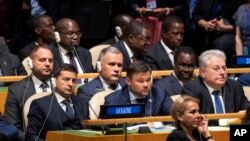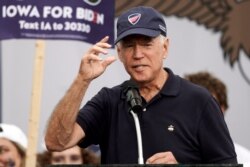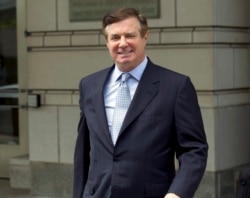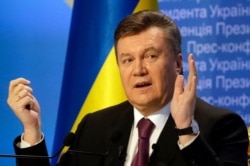Ukrainian officials are looking ahead anxiously to a meeting Wednesday between their new president, Volodymyr Zelenskiy, and U.S. President Donald Trump, fearing their country is being dragged into the middle of an American political battle that could undermine its bilateral U.S. support.
Both major U.S. political parties have largely supported Kyiv since the 2014 Maidan uprising that forced Kremlin ally Viktor Yanukovych from power But Ukrainian officials worry that Zelenskiy, a political novice, won't keep his footing on a diplomatic tightrope when he meets Trump on the sidelines of the United Nations General Assembly in New York.
They feel a stumble could have long-term repercussions for U.S.-Ukraine relations as Kyiv confronts Russian aggression in Crimea and eastern Ukraine.
On Friday, news organizations reported that Trump, in a July 25 phone call, repeatedly pressed Zelenskiy to investigate activities in Ukraine by Joe Biden, a Democratic candidate seeking to defeat Trump in the 2020 presidential race, and Biden's son Hunter.
Biden has boasted that, as a member of the Obama administration, he threatened to withhold $1 billion in guaranteed loans to Ukraine if Ukraine failed to fire the country’s then general prosecutor, Viktor Shokin. Despite a lack of hard evidence of wrongdoing, some Trump allies charge that Biden made the request because Shokin was investigating the owner of energy company Burisma Holdings. Biden’s son, Hunter, was serving at the time on Burisma's board of directors.
The owner of Burisma, Mykola Zlochevsky, a tycoon and former top government official, was a target of off-and-on graft investigations and was suspected of money laundering and abuse of power. In April 2014, the month Hunter Biden, a onetime Washington lobbyist, joined Burisma, British officials, as part of an investigation into money laundering, froze London bank accounts containing $23 million that allegedly belonged to Zlochevsky.
Hunter Biden’s appointment to the Burisma board raised eyebrows at the time in the Ukrainian capital, with some analysts saying it sent the wrong message about Washington’s seriousness in supporting reform efforts in Kyiv.
On Sunday, Trump said his phone call with Zelenskiy was largely an opportunity to congratulate the Ukraine leader on his election victory earlier in the year. But he acknowledged it also touched on corruption in Ukraine and the allegations that have been leveled against Biden by Trump’s personal lawyer, Rudy Giuliani, and other Republican officials. Trump says he did nothing wrong.
Giuliani has also been trying to persuade Ukrainian authorities to look into claims that the previous Ukrainian government under Petro Poroshenko conspired to help former Democratic presidential candidate Hillary Clinton during her 2016 White House race by leaking documents implicating lobbyist Paul Manafort, a onetime Trump campaign chairman, in corruption connected to Yanukovych.
Trump's July 25 telephone call is now at the center of an escalating political battle in Washington, reportedly prompted by a complaint filed by a whistleblower – a U.S. intelligence official working in the White House who alleged Trump had jeopardized U.S. national security by making an alarming “promise” to a foreign leader.
A transcript of the phone call has not been released. Biden has called for an investigation, claiming Trump misused his authority.
“This appears to be an overwhelming abuse of power. To get on the phone with a foreign leader who is looking for help from the United States and ask about me and imply things ...this is outrageous,” Biden said during a campaign stop in Iowa.
Trump countered on Monday, saying, “I put no pressure on them [Ukraine] whatsoever.” He added on his arrival Monday at the U.N. General Assembly in New York, “I did not make a statement that you have to do this or I won’t give you aid.”
For many Ukrainians the allegations and counter-allegations are bewildering — regarding both Biden and Poroshenko's alleged campaign assistance to Clinton. Despite U.S. media reports, former Poroshenko aides say they provided no help to the Clinton campaign, although they were reportedly on the receiving end of repeated behind-the-scenes pleas from Democrats who were seeking information that could be embarrassing to Trump.
Documents detailing Manafort’s years-long dealings with Yanukovych, whom he advised on electoral strategies and international relations, were made public, but by a Ukrainian lawmaker, not by any Ukrainian investigatory body.
Like Zelenskiy’s aides now, Poroshenko’s advisers feared being drawn into America’s partisan politics. “All along Kyiv has taken the view that helping one party will infuriate the other party, complicating our lobbying efforts on Capitol Hill and causing a terrible problem later when, or if, there’s a change in the White House,” a Ukrainian diplomat told VOA, speaking on condition that he wouldn’t be identified.
"Much of the context and detail both on Burisma and Manafort are being left out amid half-truths and U.S. media distortions," he said, noting that some of the more colorful articles have been long on accusations while short on the facts. "What is infuriating is reading some of the U.S. media reports,” the Ukrainian diplomat said.
"They are mostly written by very partisan authors or by Washington-based journalists who have no deep reporting experience in Ukraine and are very selective in what they report and don’t realize they are often manipulated by people here who also have their own axes to grind,” he added.
The pressure Biden applied on Kyiv for Shokin to be fired during the Poroshenko administration was in keeping with Obama administration policy, Ukrainian officials and former U.S. diplomats say.
Along with other Western governments, the Obama administration stressed the need for Kyiv to tackle endemic corruption and was frustrated with the stalled post-Maidan reform effort. The state prosecutor was identified as a key part of the problem and was accused by Western diplomats and officials of obstructing anti-corruption inquiries and stalling probes, as well as shielding his own employees from graft investigations.
On Sept. 24, the then-U.S. ambassador Geoffrey Pyatt, who worked closely with Biden, the Obama administration’s point person on Ukraine, delivered a notably blunt speech, telling a group of business executives and investors: “Rather than supporting Ukraine’s reforms and working to root out corruption, corrupt actors within the Prosecutor-General’s Office are making things worse by openly and aggressively undermining reform.”
Former U.S. diplomats highlight the fact that Pyatt singled out the case of Burisma owner Zlochevsky as an example of the stalled anti-corruption drive. Pyatt argued that an investigation should be launched into the Prosecutor-General’s Office for blocking efforts to pursue tens of millions of dollars in “illicit assets” that Zlochevsky had deposited in Britain while serving as environment and natural resources minister under former president Yanukovych.
Pyatt said that “those responsible for subverting the case” against Zlochevsky “should -- at a minimum -- be summarily terminated.” The envoy was speaking days after Ukrainian prosecutors refused to provide documents needed in the British investigation, resulting in a London court ordering the unfreezing of the tycoon’s assets.
Zelenskiy will be keen to mollify Trump when he meets him in New York, as well as to shore up vital U.S. financial and military support that Kyiv relies on in its resistance to Russia-backed rebels in the east of the country. He is unlikely to agree to open a probe, though, into Hunter Biden.
“This is a terrible mess,” said Tetiana Popova, a media commentator and former Ukrainian information minister, to VOA. “If the U.S. government wants to investigate Biden’s son, they should start their own probe. If the U.S. government asks for documents, Ukraine could provide them. But why should Ukraine start a probe of a U.S. citizen who I doubt has broken any laws of Ukraine?”
Vadym Prystaiko, Ukraine’s foreign minister, told reporters Kyiv appreciates the support its has been getting from both the Republicans and Democrats. “But that does not mean that we would like to help, or even could in theory, one of the [U.S.] parties.”









